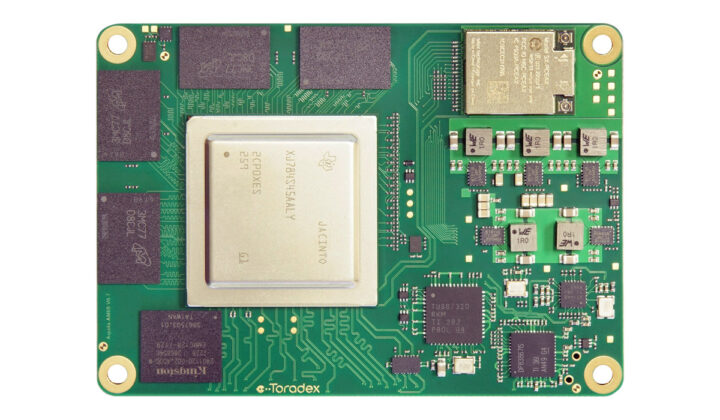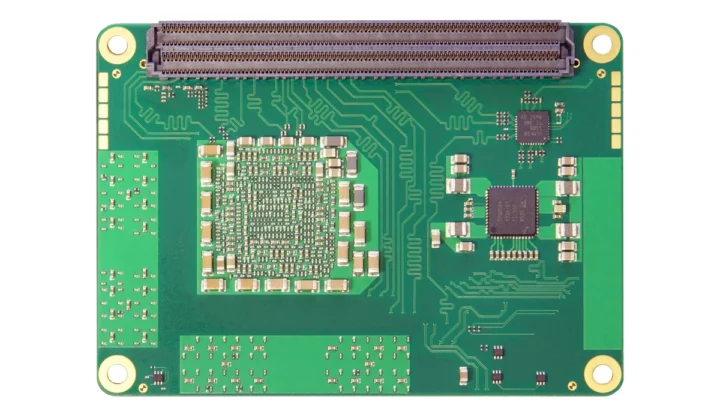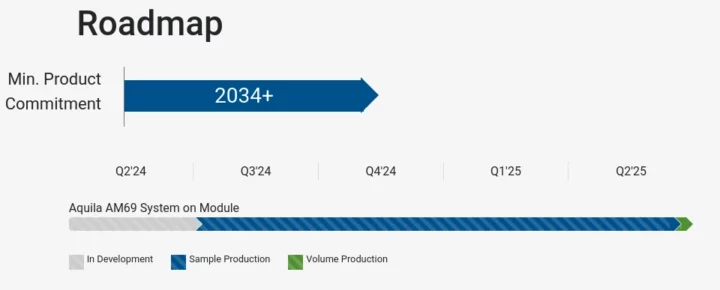Toradex Aquila AM69 is the first system-on-module (SoM) from the company’s Aquila family with a small form factor and a rugged ~400-pin board-to-board connector targetting demanding edge AI applications in medical, industrial, and robotics fields with Arm platforms that deliver x86 level of performance at low power.
The Aquila AM69 SoM is powered by a Texas Instruments AM69A octa-core Arm Cortex-A72 SoC with four accelerators delivering 32 TOPS of AI performance, up to 32GB LPDDR4, 128GB eMMC flash, built-in WiFi 6E and Bluetooth 5.3 module, and a board-to-board connector for display, camera, and audio interfaces, as well as dual gigabit Ethernet, multiple PCIe Gen3 and SerDes interfaces. All that in a form factor that’s only slightly bigger (86x60mm) than a business card or a Raspberry Pi 5.

Toradex Aquila AM69 specifications:
- SoC – Texas Instruments AM69A
- Application processor – Up to 8x Arm Cortex-A72 cores at up to 2.0 GHz with 2MB shared L2 cache with ECC
- MCU core – 2x Cortex-R5F real-time cores at up to 1.0 GHz
- GPU – Imagination Technologies BXS-4-64 up to 800 MHz
- AI accelerators
- 4x Deep Learning Accelerators up to 32 TOPS
- 2x Vision Processing Accelerators (VPAC) with Image Signal Processor (ISP)
- 2x Video Encoder/Decoder – H.265, H.264 decoding/encoding up to 4Kp60
- Memory – Up to 32GB LPDDR4 (128-bit) RAM
- Storage – 128GB eMMC flash
- Wireless – On-module tri-band (2.4/5/6 GHz) WiFi 6E 2×2 MIMO and Bluetooth 5.3
- Rugged high-speed board-to-board connector with about 400 pins
- Storage – 1x SDIO/SD/MMC
- Display I/F
- 2x quad-lane MIPI DSI
- 1x DP 1.4 or 1x eDP 1.4
- Audio – 2x I2S
- Camera I/F – 3x quad-lane MIPI CSI-2 (12x Virtual Channels)
- Networking – Gigabit Ethernet with AVB and second RGMII interface
- USB – 1x USB 3.2 DRD, 1x USB 3.2 Host
- Serial – 4x CAN Bus, 4x UART
- Other low-speed digital I/Os – 7x I2C, 2x SPI, 1x QSPI, 4x PWM, 16x GPIO
- 8x Analog Input
- Expansion
- 2x PCIe Gen3 x2
- 4x SerDes (SGMII)
- Debugging – JTAG
- Power Dissipation – Approx. 5W – 25W
- Dimensions – 85 x 60mm
- Temperature Range – -40°C to +85°C
- Shock / Vibration – EN 60068-2-6/50g 20ms
Toradex will provide two reference images for the Aquila AM69 SoM: one based on the Yocto Project and the other based on the company’s Torizon OS that’s also built with the Yocto Project but is a ready-to-use Embedded Linux distribution that is configurable for a custom carrier board using the TorizonCore Builder Tool. FreeRTOS support is also coming soon, I’d assume running on the Cortex-R5F, and BlackBerry QNX and/or Android can be offered upon request.
Typical applications for the Aquila AM69 include high-performance edge computing, Artificial Intelligence (AI) and Machine Learning (ML), computer/machine vision, automated and autonomous vehicles and robots (AMR), high-resolution HMIs, real-time processing and control, and more.
We’ve been writing about Toradex even since the entry-level Colibri family, but the company has since then launched the Verdin and Apalis with higher performance, and the Aquila is the most powerful (and expensive) family of system-on-modules introduced by the Swiss company so far. All previous families relied on edge connectors such as 200-pin/260-pin SO-DIMM and 314-pin MXM3 connectors, and the Aquila family is the first Toradex system-on-module to make use of a board-to-board connector instead.
The Aquila AM69 CPU module will sample in Q3 2024, general availability will take longer, and mass product appears to be scheduled for the end of Q2 2025 or Q3 2025. That’s usually related to the mass production of the processor itself, in this case, Texas Instruments AM69A, as it takes a long time to qualify this type of complex, industrial-grade processor that may also be used in medical equipment. A few more details may be found on the product page.

Jean-Luc started CNX Software in 2010 as a part-time endeavor, before quitting his job as a software engineering manager, and starting to write daily news, and reviews full time later in 2011.
Support CNX Software! Donate via cryptocurrencies, become a Patron on Patreon, or purchase goods on Amazon or Aliexpress







